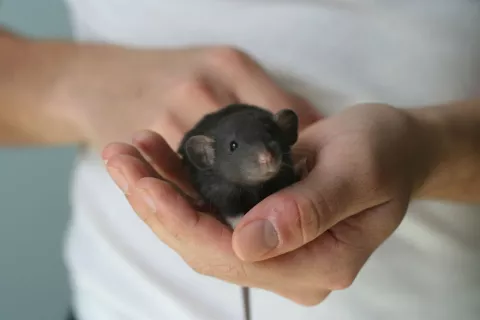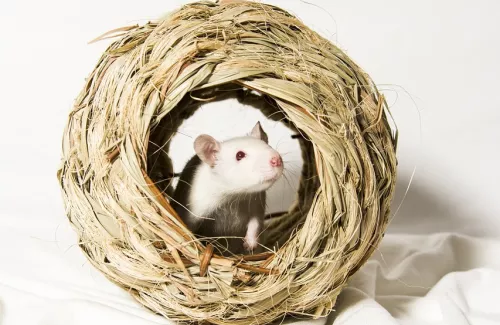The Ultimate Guide to Caring for Pet Rats
Welcome to our Basic Guide for caring for your pet rat.
This is your roadmap to starting on the right foot, featuring an overview of all the topics you can explore further by browsing through our detailed articles.
So, get comfortable and let us guide you through the world of pet rats!

Choosing the Right Pet Rat
Exploring Different Breeds of Pet Rats
When it comes to choosing a pet rat, it's essential to be aware of the various breeds available.
In reality, all pet rats belong to the same species, the brown rat (Rattus norvegicus).
However, thanks to genetic selection, there is a wide array of varieties and colors.
Among the most popular are:
- The standard rats (with short fur)
- The rex rats (with curly fur)
- The dumbo rats (with large rounded ears)
- The hairless rats (without fur)
Each variety has its unique charm and characteristics.
See the article on different rat breeds and their characteristics
Criteria for Selecting a Pet Rat: Age, Gender, and Personality
- Age: Young rats (6-8 weeks) adapt quickly and are easy to tame, while well-socialized adult rats also make excellent companions.
- Gender: Males are larger and often more relaxed, while females are smaller and sometimes more active. Both can make excellent pets, but be mindful of breeding if you have both genders.
- Personality: Each rat has its own personality. Some are calm and affectionate, others are adventurous and active. Take time to observe and choose a rat that matches your lifestyle.
In summary
Setting Up a Welcoming Home for Pet Rats
How to Choose the Best Cage for Pet Rats
The cage is the home of our furry friend. Therefore, choose a good cage: spacious, sturdy, and well-ventilated.
Rats are natural athletes and climbing enthusiasts, so opt for a multi-level cage.
Don’t forget to decorate it with cozy corners, platforms, ladders, and hammocks to keep your pet rat entertained and relaxed.
Ensure to place the cage in a quiet area, safe from draughts.
Check out our guide to the best cages
Setting Up Your Rat's Cage
It’s essential for your rat to always have access to a water source. A water bottle or a bowl is perfect, placed beside their food dish.
Remember the accessories for the well-being of your rat. They are playful creatures, so don’t hesitate to provide them with suitable toys: balls, tunnels, and chewable paper blocks. These can be found in pet stores or made at home using recycled materials (like cardboard, which is perfect!).
Safe Bedding Choices and Materials to Avoid for Rats
To ensure comfort and health for your rat, it’s crucial to choose a high-quality bedding.
Favor beddings made of recycled paper, hemp, or corn, which are gentle on their little feet and low in dust.
Avoid beddings made from wood shavings, especially those from pine and cedar, as they can be toxic and cause respiratory issues.
Remember to change the bedding regularly to keep the cage clean and odor-free.
In summary
Essential Guidelines for Feeding Pet Rats
Understanding the Nutritional Needs of Pet Rats
Our little pet rats are omnivores and love a varied diet.
They need gourmet meals, rich in proteins, fibers, and vitamins.
Fats are also necessary, but just in the right amount!
A balanced diet is key to avoiding health issues related to malnutrition.
Recommended Foods for Pet Rats and What to Avoid
To pamper your pet rat and provide the ideal food, choose items specially tailored to their needs.
Our furry friends adore seed mixes for rodents, fresh fruits and vegetables (apples, broccoli, carrots...), animal proteins (cooked chicken, eggs) and whole grains.
Avoid toxic foods that could harm them, such as citrus fruits, onions, garlic, chocolate, fizzy drinks, and foods too high in fat or salt.
Don't forget to vary your rat's diet to maintain their interest and prevent deficiencies!
Healthy Treats and Supplements for Pet Rats
Treats are an excellent way to interact with your pet rat and strengthen your bond.
Offer them small pieces of fruits, vegetables, or seeds occasionally. But be careful not to overdo it, as excessive treats can lead to weight and health issues.
Regarding supplements, they are generally not necessary if your rat has a balanced diet. However, in certain situations like pregnancy or health problems, supplements may be useful. Always consult your veterinarian before giving any to your rat.
Consult our guide on rat nutrition
In summary
Maintaining the Health and Well-being of Pet Rats
Identifying Signs of Good Health in Pet Rats
A healthy pet rat is a curious, lively little creature with a clean and silky coat.
Its eyes sparkle with life, free from tearing.
Its ears and nose are pristine, showing no signs of infection.
Its teeth are well aligned, and its tail is immaculate, without any dirt or crust.
A stable weight and steady breathing are other indicators of thriving health.
Common Health Issues in Rats and How to Prevent Them
Our rat friends may encounter various health issues.
Here are some common ones and how to prevent them:
- Respiratory Infections: Maintaining a well-kept cage away from drafts can prevent respiratory infections. Regularly change bedding and clean accessories to limit bacteria and irritants.
- Tumors: Tumors are quite common in rats, especially in females. Spaying females can reduce the risk of mammary tumors. Consult a vet if you notice any unusual lumps or swellings.
- Parasites: Rats can suffer from external parasites like mites and fleas. To prevent this, keep their environment clean and use vet-recommended antiparasitic treatments if necessary.
Basics of Veterinary Care for Pet Rats
To maintain your pet rat's health, consult a veterinarian specialized in exotic pets.
Regular visits help in early detection and treatment of health issues.
Vaccinations are not required for pet rats, but they may need other care, such as dental extractions or antiparasitic treatments.
In case of any issues, do not hesitate to seek advice and appropriate care from your veterinarian.
Common Diseases: Prevention and Treatments
In summary
Understanding the Behavior of Pet Rats
Key Behavioral Traits of Pet Rats
We know that rats are intelligent and sociable little beings.
Here are some of their amusing behavioral traits we can observe:
- Exploration: Rats love to discover their surroundings, enjoy climbing, running, and sneaking into tight spaces.
- Grooming: They dedicate time to their cleanliness, thereby strengthening their social bonds.
- Playfulness: Rats adore playing. Chasing, play-fighting, or hide-and-seek; interactive games and toys like tunnels, hammocks, and ropes are greatly enjoyed.
- Cozy Nests: They like to create cozy nests with paper, cardboard, or fabrics.
Recognizing Signs of Stress or Discomfort in Rats
It's crucial to detect signs of stress in our pet rats to ensure their happiness and health.
Here are some signs to watch out for:
- Aggression: A stressed rat may become aggressive, requiring investigation into the cause of this stress.
- Isolation: A rat that isolates itself could be suffering from a health, social, or unsuitable environment issue.
- Loss of Appetite: A rat refusing to eat could indicate a serious health problem. A veterinarian consultation then becomes necessary.
- Repetitive Behaviors: A rat that continuously licks, scratches, or bites the bars of its cage might be stressed or uncomfortable.
- Ruffled Fur: A stressed rat may have ruffled fur, another indicator of discomfort to watch for.
- Weight Loss: Unexplained weight loss can be a sign of stress or illness in rats.
To learn more about the behavior of pet rats, feel free to read our article: How to Know if My Rat Loves Me? Interpreting Your Pet Rat's Behavior
In summary
The Ins and Outs of Breeding Pet Rats
Fundamentals of Breeding Pet Rats
Breeding pet rats is a relatively straightforward process.
Rats reach sexual maturity between 6 and 8 weeks for males, and 8 to 12 weeks for females.
Females have reproductive cycles every 4 to 5 days and can become pregnant again immediately after giving birth.
The gestation period generally lasts 21 to 23 days, and a litter can contain 6 to 12 baby rats, sometimes more.
However, it is advisable to wait until they are at least 3 months old before allowing them to breed.
Ethical and Legal Aspects of Rat Breeding
Before adopting pet rats, it's essential to consider the ethical and legal aspects.
Caring for these animals requires time, attention, and some financial resources to ensure their well-being.
You'll also need to be prepared to find loving homes for the baby rats once they are weaned.
Don't forget to check local laws regarding pet breeding and any necessary licenses for this activity.
Be also aware of the health risks associated with breeding, such as diseases and infections that can spread quickly within a rat colony.
Caring for a Litter of Baby Rats
Managing a litter of baby rats can be challenging, but with the right knowledge and preparation, it can be a rewarding experience.
Here are some tips for caring for a litter of baby rats:
Separate the males from the females before mating to avoid surprises.
Prepare a cozy and secure space for the mother and her babies, with clean bedding, food, and water. Regularly monitor the health of the mother and babies, and consult a veterinarian if you have concerns.
Baby rats start eating solid food around 2 to 3 weeks, but should stay with their mother until they are weaned, usually between 4 and 6 weeks.
Once weaned, separate the male and female baby rats to avoid early pregnancies.
In summary
Top Product Recommendations for Pet Rats
Best Food and Pellets for Pet Rats
Providing a balanced diet to your pet rat is essential for ensuring their health and well-being.
The market offers several high-quality brands with various mixes and formulas designed to meet the nutritional needs of your little companion.
To learn more about the best rat food brands and what to consider when buying, take a look at our complete guide here: [under construction]
Must-Have Accessories for Pet Rats
To provide a cozy and stimulating environment for your rat, certain accessories are essential, such as:
- A spacious, well-equipped cage
- Suitable litter boxes
- Feeders and water bottles
- Hammocks and hiding spots
- Pipes and tunnels for climbing and exploring
To learn more about these accessories and how to choose them, check out our detailed guide: [under construction]
Popular Toys and Entertainment for Pet Rats
As they are intelligent and curious animals requiring mental and physical stimulation for happiness and health, offering a variety of toys and entertainments specially designed for them is beneficial, such as:
- Toys for chewing and nibbling
- Interactive and puzzle toys
- Jumping and climbing platforms
To discover the favorite toys and entertainments of pet rats and how to use them to stimulate your pet's mind, check out our guide: [under construction]
In summary
Conclusion
Well, there you have it, our little beginner's guide to caring for your pet rat is complete.
We hope that this exploration of key elements, like choosing your rat, preparing its cozy little nook, its diet, socialization, health, and welfare, has given you a solid foundation for pampering your new furry friend.
Don't hesitate to check out our recommended products to make life easier with your new buddy 🐀
The fascinating world of pet rats promises memorable moments with your little furry friend.
Feel free to expand your knowledge and join other rat owners to exchange tips and stories.
You'll see, rats are intelligent, affectionate, and full of surprises.
As a new rat parent, know that you're about to embark on a rewarding journey.
Rats are extraordinary animals, and caring for them is a responsibility that will fill you with joy and priceless moments.
So, dear rat lovers, get ready to embark on an incredible adventure with your pet rat, and cherish every moment shared together! 😊
